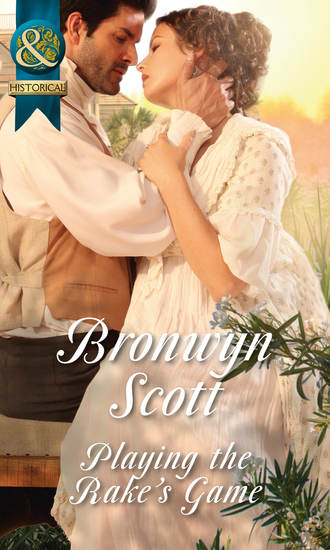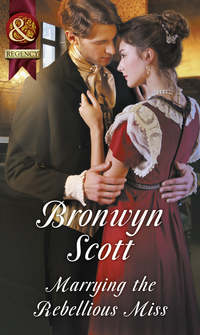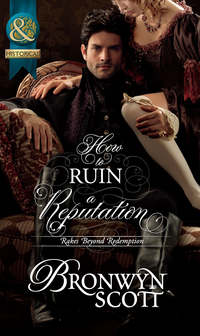
Полная версия
Playing the Rake's Game

RAKES OF THE CARIBBEAN
Sun, sand and sizzling seduction
Notorious rogues Ren Dryden and Kitt Sherard used to cut a swathe through the ton, but they were too wild to be satisfied with London seasons and prim debutantes.
Now they’ve ventured to the sultry Caribbean to seek their fortunes … and women strong enough to tame them!
Ren meets his match in spirited Emma Ward. Relish their seductive battle of wits in PLAYING THE RAKE’S GAME Available January 2015
Kitt has never met a woman as unconventional as Bryn Rutherford. Enjoy their scorching chemistry in BREAKING THE RAKE’S RULES Available February 2015
And look out for the Mills & Boon® Historical Undone! eBook CRAVING THE RAKE’S TOUCH Already available
You won’t want to miss this sizzling new series from Bronwyn Scott!
BRONWYN SCOTT is a communications instructor at Pierce College in the United States, and is the proud mother of three wonderful children (one boy and two girls). When she’s not teaching or writing she enjoys playing the piano, travelling—especially to Florence, Italy—and studying history and foreign languages.
Readers can stay in touch on Bronwyn’s website, www.bronwynnscott.com, or at her blog, www.bronwynswriting.blogspot.com—she loves to hear from readers.
AUTHOR NOTE
I hope you enjoy the new locale for this mini-series: the sunny Caribbean! There was plenty of British activity in the Caribbean not just in the eighteenth century, when Britain tamed the waters against piracy, but in the nineteenth century too.
Ren’s story is set against the backdrop of Barbados entering into its era of emancipation. His story comes right after the abolition of slavery—which had some significant anticipated and unanticipated repercussions.
One of the big issues which was anticipated dealt with wages and labour. Would it ruin the plantations’ abilities to make a profit if labourers had to be paid? To offset this, the British parliament gave the planters what we might today call a ‘financial incentive package’. They also set up the apprentice system. One historian notes that the system was meant to instruct newly freed slaves in the management of wages while helping planters access a ‘stable labour force’. Needless to say what worked well in theory was soon abused by the planters, who were bemoaning the loss of their power.
Another concern was political: the Plantocracy feared that freed slaves would want to vote and, of course, those votes would outnumber the white vote. And the final, perhaps somewhat unlooked-for consequence of emancipation was the finite availability of land. Freed slaves who wanted to be landowners and farm their own land simply didn’t have access to it. On an island, land is finite.
This is the scenario Ren Dryden enters when his story opens. He thinks a plantation in the Caribbean will be the answer to his family’s own financial problems, only to realise he’s inherited far more than he bargained for. I hope you enjoy Ren’s story, and learning a little about the context in which it is set.
Playing the
Rake’s Game
Bronwyn Scott

www.millsandboon.co.uk
For my awesome staff on the Disney Fantasy:
Gabriella and Nicolas, who kept us fed, and Puhl, who had to clean my kid’s stateroom every day and still greeted me happily every morning.
Contents
Cover
Introduction
About the Author
Author Note
Dedication
Chapter One
Chapter Two
Chapter Three
Chapter Four
Chapter Five
Chapter Six
Chapter Seven
Chapter Eight
Chapter Nine
Chapter Ten
Chapter Eleven
Chapter Twelve
Chapter Thirteen
Chapter Fourteen
Chapter Fifteen
Chapter Sixteen
Chapter Seventeen
Chapter Eighteen
Chapter Nineteen
Chapter Twenty
Chapter Twenty-One
Chapter Twenty-Two
Chapter Twenty-Three
Chapter Twenty-Four
Epilogue
Copyright
Chapter One
Bridgetown, Barbados—early May, 1835
Ren Dryden believed two things about the nature of men: first, a wise man didn’t run from his troubles and, second, only a foolish man ran from his opportunities. Ren considered himself in league with the former, which was why he’d spent two weeks aboard a mail packet aptly named the Fury, braving the Atlantic and sailing away from all he knew. In truth, a large part of himself had revelled in the danger of the adventure; revelled in pitting his strength against the sea. He even revelled in the unknown challenges that lay before him on land. At last, he could take action.
Ren levered himself out of the bumboat that had rowed him ashore, tossed the boatman a coin and stood on the Bridgetown dock, feeling a kindred spirit with the bustle of commerce about him. His blood hummed with the excitement of it. Ah, the Caribbean! Land of rum and risk.
Ren surveyed the activity with an appreciative eye, taking in the vibrant colours of people, of fruits, sky and sea, the scents of citrus and sweat, the feel of heat against his face. It was a veritable feast for the senses and he engaged the feast wholeheartedly. Life began today, more specifically his life, a life of his choosing and his making, not a life predestined for him based on the caprices of earlier generations of Drydens.
There were plenty of people in London who would say he was avoiding his problems. The list was long and distinguished, ranging from his family, who’d found the ‘perfect solution’ to their little problem of ‘dynastic debt’ in the form of a weak-eyed, sallow-cheeked heiress from York, to the creditors who hounded him through the grey streets of London, even being so bold as to lie in wait for him outside his exclusive clubs.
There were also plenty of men of his acquaintance who would have bowed to the inevitable, married the heiress, paid the debt and spent their lives blindly acquiring new debt until their sons had to make the same sacrifices a generation later. He had promised himself years ago when he’d come of age he would not be a slave to the past.
Ren found it rather frightening that not only would those men have bowed to the inevitable, but they would have preferred to bow instead of breaking free. After all, there was a certain comfort to be found in the known. He understood the penchant for the familiar and he pitied the men who craved it. Ren had never counted himself among that number.
On the outside, perhaps he resembled his peers in clothing, clubs and mannerisms, but inside, he’d always been different, always railed against the things and people that kept him leashed, his hopes restrained by the narrow parameters that defined a gentleman’s potential.
All that railing had paid off, all that hope was now fulfilled. He was here and he’d broken free, although it came with a price, as freedom always did. If he failed in this venture, his family failed with him; his mother, who had wilted after his father’s death; his two sisters, one waiting for a debut, the other waiting to wed; and thirteen-year-old Teddy who would be the earl of debt-ridden lands should Ren not return.
Ren’s hand curled tightly around the valise he’d brought with him from the boat. He’d not trusted it to remain with his trunks to be brought ashore separately. His future was in the valise: the letter of introduction and a copy of Cousin Merrimore’s will bequeathing him fifty-one per cent interest in a sugar plantation—majority interest in a profitable business.
There would be shareholders to deal with, but technically the entire place was his to control. He would not fail. As unseemly as it was for a gentleman of his birth, he’d made it a point to know the dynamics of trade—he’d quietly made investments on the Exchange, invested in an occasional cargo. He’d listened to discussions in Parliament and taken an active interest in political circles when he was in London.
As a result, he did not come to Barbados without at least some knowledge of Britain’s colonial gem. Nor did he come without his opinions. He would make an honest profit and he would pay an honest wage to see it done. He would not raise his family up by abusing the sweat of other men. Even a desperate man had ethics.
‘Ahoy there, Dryden, is that you?’ A tall, bronzed man with sun-bleached hair cut through the crowd, taking Ren by momentary surprise. Ren might not have recognised the man, but he’d know the voice of his one-time best friend anywhere in the world, case in point. London would have an apoplexy if it could see its one-time ballroom favourite now. The Caribbean had bleached his dark-blond hair and tanned his pale skin.
‘Kitt Sherard!’ Ren felt his face break into wide grin. ‘I wasn’t sure if you’d make it.’ He’d sent a letter on the mail packet preceding him telling Kitt of his arrival, but there’d been no chance to receive a response.
‘Of course I made it. I wouldn’t leave you stranded at the docks.’ Kitt pulled him into a strong embrace. ‘What has it been, Ren? Five years?’
‘Five long years. Look at you, Kitt. Barbados agrees with you,’ Ren exclaimed. He couldn’t get over the completeness of his friend’s transformation. Kitt had always been wild at heart, but now the wildness had entirely taken over. His hair was not only bleached, but long, and his dress more closely resembled the loose clothing of those swarming the docks than the traditional breeches and coats Ren had on. They looked more comfortable too. But the eyes were the same: a sharp, shrewd sea-blue. It was Kitt all right and it felt good to see a friendly face.
‘It does indeed.’ Kitt laughed as a pretty, coffee-skinned fruit seller approached, swinging her hips.
‘Fresh fruit, me loves, de best on de island. Is this handsome fellow a friend of yours, Mr Kitt?’ She wafted a firm round orange under Ren’s nose, teasing him with its citrusy scent. The persuasion was effective. After two weeks without anything resembling ‘fresh’, the orange was a temptation nonpareil. She might as well have been Eve with the apple, and if Eve had been wearing a scoop-necked blouse like this island beauty, Ren completely understood why Adam had eaten it.
‘He’s come all the way from London, Liddie. You be good to him.’ Kitt gave her two coins and took the fruit, tossing it to Ren.
‘Are all your friends this handsome?’ Liddie flirted with Ren, the loose neck of her blouse gaping open to offer a quick glimpse of firm, round fruit of a more erotic sort. She flashed him an inviting smile.
Kitt feigned wounded pride, a hand on his heart. ‘More handsome than me, Liddie?’
Liddie laughed. ‘You’re too much for a poor girl like me, Mr Kitt. Are you going to introduce me?’
‘Liddie, this is Ren Dryden, Albert Merrimore’s cousin. He’s going to be taking over Sugarland plantation.’
Ren thought he saw Liddie take the slightest step backwards. Her next words confirmed it wasn’t his imagination. ‘There’s trouble out there.’ She shot a warning glance at Kitt. ‘You better tell him about the spirits and the witch woman, Mr Kitt.’ She fumbled with a string about her neck and pulled a necklace over her head. A chunk of black coral hung from a strip of leather. She handed it to Ren. ‘You’re going to need protection. This will keep the bad spirits away.’
Ren took the charm, unsure of what to say. The idea there was trouble at his plantation was more than a little unsettling. That the trouble involved spirits and a witch woman seemed to portend the ominous. He looked a hasty question at Kitt, who merely shrugged at the mention.
‘My friend and I are good Anglicans, Liddie. We don’t believe in spirits.’ Kitt dismissed Liddie’s worries with an easy smile
Good Anglicans? Ren fought back a laugh at the notion. He didn’t think Kitt had ever been a good anything except a good amount of trouble. Decent simply wasn’t in Sherard’s vocabulary.
Ren tucked the amulet inside his shirt and Kitt went back to flirting with Liddie. ‘I am a bit jealous though, Liddie. What about me? Don’t I get an amulet, too, just in case?’
Liddie’s face broke into a pretty smile. ‘Mr Kitt, I pity the poor spirits that mess with you, Anglican or not.’ It was a good note to leave on. Liddie sauntered away, hips swaying.
‘She likes you.’ Kitt elbowed Ren. ‘Do you want me to arrange something?’
‘No. I think women will need to wait until I can get my bearings at the plantation.’ Ren laughed. ‘You’re the same old Kitt Sherard, women falling all over you wherever you go.’
Kitt seemed to sober at that. ‘Well, not quite the same, I hope. I didn’t come here to be what I was in London and I’m guessing neither did you.’
Ren nodded in understanding. For them both, Barbados was a place for new lives. Kitt had left London five years ago rather suddenly and without warning. He’d shown up one night on Ren’s doorstep needing sanctuary but unable to explain. He’d left the next day, slinking out of town towards the ports, leaving everything behind including his real name. Ren had been the last to see him. After that, Kitt had cut all ties with the exception of random letter to him and the third of their trio, Benedict DeBreed.
Ren had no idea what Kitt had been up to since then. A silence had sprung up between them, a reminder of the profundity of their choices. Ren steered the conversation back to the practical. ‘Were you able to bring a wagon?’ It was easier not to think about the larger scope of his decisions, but to take it all step by step. The next step was to get out to the plantation.
‘It’s right over here. I think they’ve just brought your trunks ashore.’ Kitt gestured to the returning bumboat. Ren’s questions had to wait while they loaded his trunks, but his nerves were rising. What had Cousin Merrimore done? What was wrong at Sugarland? He’d expected a bit of unease. There’d been four months between his cousin’s passing and his arrival, but surely there was enough sense in the group of investors to manage things in the short term.
In fact, he’d assumed there would be very little to handle. Most plantation owners were absentee landlords who left the running of the estate to an overseer while they lived in England. But if that was the case, none of them had contacted him. It would have been simple enough to meet if they had been in England.
Since no one had come forward, Ren was starting to believe the landlords were in residence on the island. Even so, with or without his cousin’s presence or the presence of any other shareholders, the overseer would keep the plantation going just as he always had. Ren ran a finger beneath his collar, the heat starting to make his garments uncomfortable. He shot an envied glance Kitt’s direction.
‘Take off the damn coats, Ren. We aren’t in England any more.’ Kitt laughed at his discomfort. ‘Even the heat’s different here, but you’ll learn how to cope. You’ll get used to it.’ He winked. ‘If you’re anything like me, you’ll even like it.’
Ren grinned and shrugged out of his jacket. ‘I love the heat and I don’t think London ever had a sky this blue. This is paradise.’ Just minutes off the boat and he could see the allure of this place. Everything was different: the sky, the heat, the fruit, the people.
The talk of spirits and witches didn’t bother him so much as did the fact that they were connected to his property. He’d risked everything to come here. Hell, he’d left the earldom unprotected, having turned the day-to-day affairs entirely over to his steward and solicitors. He could trust them, of course, and if he was wrong on that account he’d left his close friend, Benedict DeBreed, in charge to ensure he wasn’t. He had protections in place, but still, if he’d been Trojan Horsed...well, the consequences didn’t bear thinking about. He’d find a way to make it work.
Ren climbed up on to the wagon and squeezed in next to Kitt. He decided to ease into the conversation. ‘Thanks again for coming to get me.’
‘I’m glad to do it, although I’m sure someone from the plantation would have been happy to come out.’ Kitt chirped to the horse and caught his eye when Ren said nothing. ‘They do know you’re coming, don’t they?’ He paused, interpreting the silence correctly. ‘Oh, hell, they don’t know.’
‘Not exactly,’ Ren said slowly. ‘I wasn’t sure there would be a “they” out there. I assumed Cousin Merrimore was the only one in residence.’ By the time he’d rethought that hypothesis it had been too late to send a letter.
Kitt shifted on the seat next to him and Ren’s sense of foreboding grew. ‘Well, out with it, Kitt. Tell me what’s wrong at Sugarland. Are there really witches and spirits?’ Ren absently fingered the chunk of coral beneath his shirt. Bridgetown was behind them now and there was an overwhelming sense of isolation knowing that they’d just left the only town on the island behind. For a city man used to having entertainments, food and anything else he needed at his fingertips or at least within a few streets, it was a daunting prospect indeed, a reminder of the enormity of what he’d chosen to do. He would be relying on himself and himself alone. It would be a true test of his strength and knowledge.
Kitt shook his head. ‘It’s a bad business out there—of course, I don’t know the half of it. I’m gone most weeks.’ Ren didn’t believe that for a moment. Kitt was the sort who knew everyone and knew everything.
‘You don’t have to sugar-coat anything for me,’ Ren said sternly. ‘I want to know what I’m up against.’ Had he taken on more than he could manage? Assumptions were dangerous things and he’d made a few about Cousin Merrimore’s property, but he’d had no choice. It was either marry the heiress or gamble on the inheritance.
Kitt gave another of his shrugs. ‘It’s the apprenticeship programme. It’s a great source of controversy in the parish.’
Ren nodded. ‘I am familiar with it.’ Slavery in the British Caribbean had been abolished a couple of years ago. It had been replaced with the notion of apprenticeship. The idea was decent in theory: pay the former slaves who were willing to work the land they’d once worked for free. In practice, the situation was not far different than slavery.
Kitt went on. ‘Finding enough labour has been difficult. The plantation owners feel they’re losing too much money so they work the labourers to the bone, to death actually. As you can imagine, no one wants to work for those wages. Death doesn’t really recommend itself.’
Great, his fields were rotting and there was no one to hire. But Kitt’s next words riveted his attention. ‘Except at Sugarland and that’s what has all the neighbours angry.’
Ren let the thought settle. He tried to dissect the comment and couldn’t make sense of it. ‘You’ll have to explain, I’m afraid.’
Kitt did. ‘The plantation owners refuse to use the apprentice system fairly, except Sugarland. Anyone who wants field work, wants to work there where they are assured of a wage and safe conditions. As a result, Sugarland is the only place producing a significant profit right now.’ That was good news. Ren breathed a little easier, but just for a moment. Kitt wasn’t done.
‘Someone put it about a few months ago, at the time of your cousin’s death, that spirits were luring workers to Sugarland, that the woman running the place was in league with practitioners of black magic and that’s why the plantation was successful. Since then, the rumours have multiplied: she’s cursed the neighbouring crops, she’s put a growing spell on her own.’
‘Wait. Hold on.’ Ren grasped the information one idea at a time. Spells? Witchcraft? A woman?
Kitt took pity on him, misunderstanding the source of his agitation. ‘I know, the whole concept of black magic takes a bit of getting used to. The islands are full of it. The islands have their own names for it: voodoo, obeah. It’s from Africa. It’s full of superstitions and ghosts and spells.’
Ren thought of the chunk of coral beneath his shirt. Black magic was the least of his concerns. ‘No, it’s not that. Back up to the part about a woman. There’s a woman at the plantation?’ Cousin Merrimore’s will hadn’t said a thing about anyone, certainly not a woman.
Kitt nodded and said with the most seriousness Ren had ever heard him use. ‘Her name is Emma Ward.’
A pit opened in his stomach and Ren knew with gut-clenching clarity there was no ‘they’. There was no absentee landlord syndicate to write monthly updates to. There was only a ‘she’. The other forty-nine per cent belonged to a crazy woman rumoured to be casting spells on her neighbours’ crops.
Ren was starting to rethink the merits of surprise, especially when those merits were reversed. It was one thing to be the surprise as he’d planned to be. It was another to be the one who was surprised. Ren definitely preferred the former. A more cautious man would have waited in town until he could have notified the plantation. But he’d never been one to wait and he’d never been one to shy away from a challenge. He made a habit of meeting those head on, whether those challenges were notorious females or not.
Ren leaned back on the wagon seat, letting the sun bathe his face. Ah, the Caribbean. Land of rum, risk and apparently a little insanity, too.
Chapter Two
Waiting was driving her insane! Emma Ward took yet another long look at the clock on the corner of her desk. He should be here by now, Mr Fifty-One Per Cent. If he was coming. Emma idly shuffled the papers in front of her. They could have been written in Arabic for all she’d been able to focus on them today. Emma left the desk and began to pace, a far better use of her energies than staring at a paper.
Was she technically even waiting? Waiting assumed he was actually coming. What she really wanted to know was at what point could she stop waiting and be confident in the knowledge that he wasn’t coming at all?
Her nerves were a wreck and they had been every mail day since Albert Merrimore’s death. That meant she’d gone through this uncertainty for four months. Was this the day she got the letter saying Merrimore’s cousin was coming? Or worse, would it be the day he actually showed up? Anything could happen. His ship could have been delayed, he could have been personally delayed and that was if he’d decided to come at all. It was just as likely he could have rethought the notion of coming halfway around the world simply to see his property when his profits didn’t depend on whether he saw the place or not. Most gentlemen wouldn’t bestir themselves if it wasn’t required, especially since there was some risk involved. Who was she fooling? Not some risk. A lot of risk, starting with an ocean voyage. Ships went down even in the modern age of steam.
Emma scolded herself for such a morbid thought. It wasn’t that she wished he was dead, merely marooned, her conscience clarified. It was possible his ship could founder and he could float to safety on an overturned table. For four months, she’d got her wish. How much longer before she could safely assume her wish had been granted on a more permanent basis? She didn’t wish Mr Fifty-One Per Cent dead, she just wished he weren’t here.











